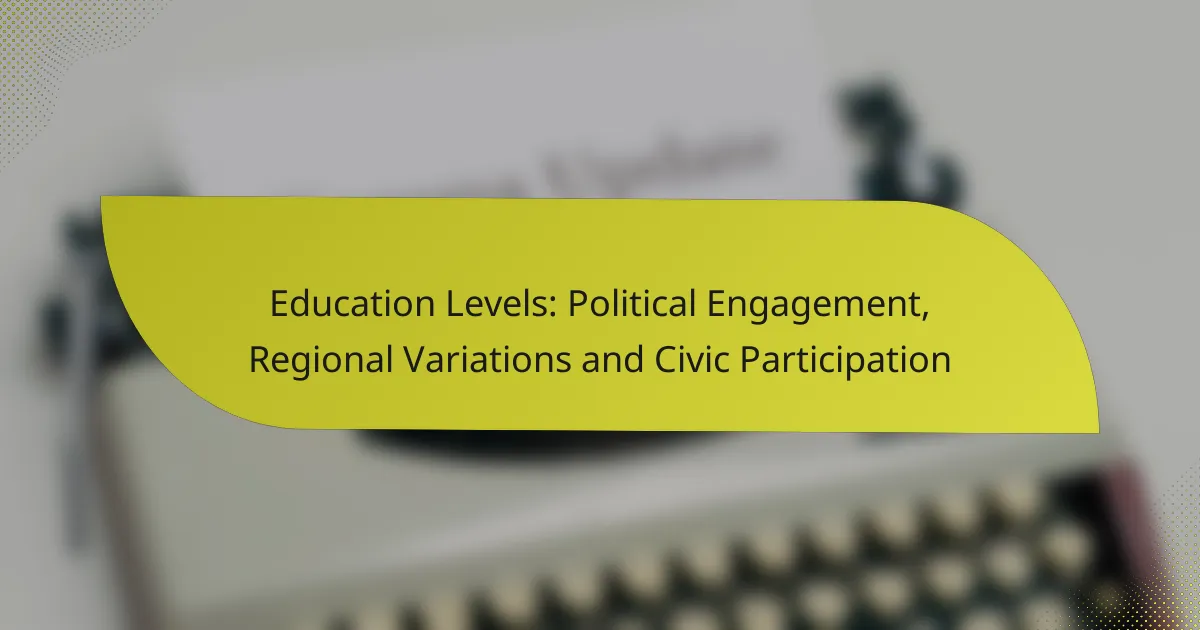Education level plays a pivotal role in shaping political engagement, with individuals possessing higher degrees often demonstrating increased participation in civic activities such as voting and community involvement. This engagement, however, varies across different regions, as local factors can influence the relationship between education and civic participation. Ultimately, active civic engagement empowers individuals to influence local policies and address community needs, fostering a stronger sense of belonging.
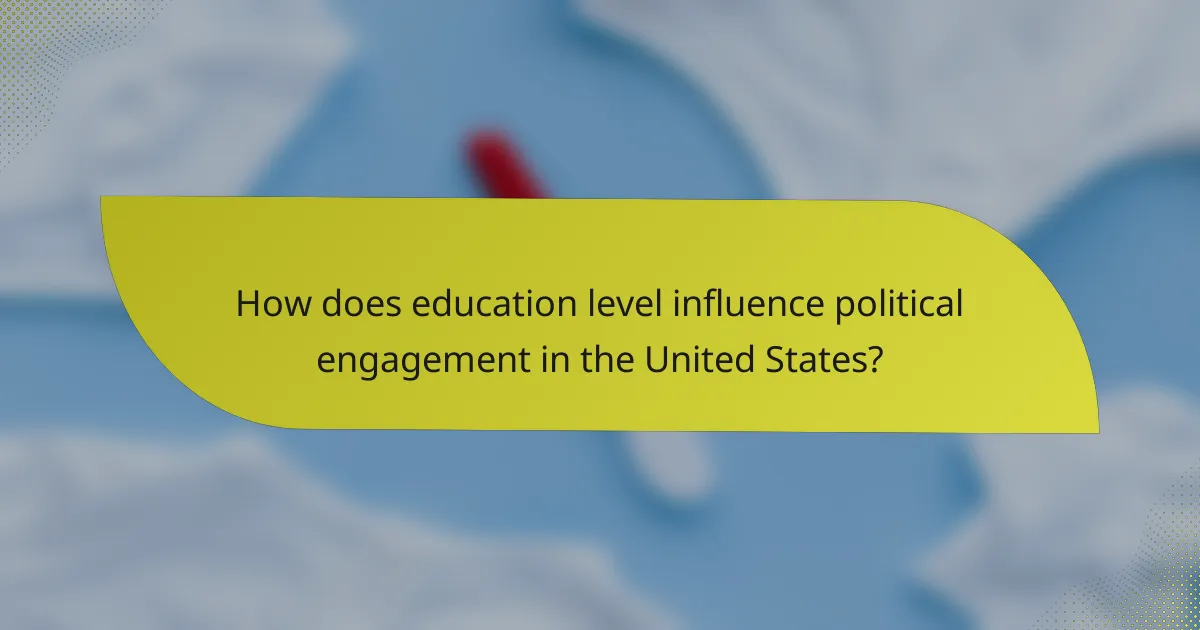
How does education level influence political engagement in the United States?
Education level significantly influences political engagement in the United States, with higher educational attainment often leading to greater participation in political processes. Individuals with advanced degrees tend to be more informed and active in civic activities, including voting and community involvement.
Higher education correlates with increased voter turnout
Research shows that individuals with higher education levels are more likely to vote compared to those with lower educational backgrounds. For instance, college graduates often have voter turnout rates that exceed 70%, while those with only a high school diploma may see turnout rates below 50%.
This trend can be attributed to several factors, including increased political awareness, access to resources, and a stronger sense of civic duty among educated individuals. Engaging in discussions about political issues in academic settings can also enhance motivation to participate in elections.
Educational attainment impacts civic knowledge
Higher educational attainment is linked to greater civic knowledge, which encompasses understanding governmental structures, political processes, and current events. Individuals with advanced degrees typically score higher on civic knowledge assessments compared to those with less education.
This knowledge enables them to make informed decisions during elections and engage in meaningful discussions about policies and governance. To improve civic knowledge, educational institutions can incorporate civic education into their curricula, encouraging students to participate in community service and political activities.
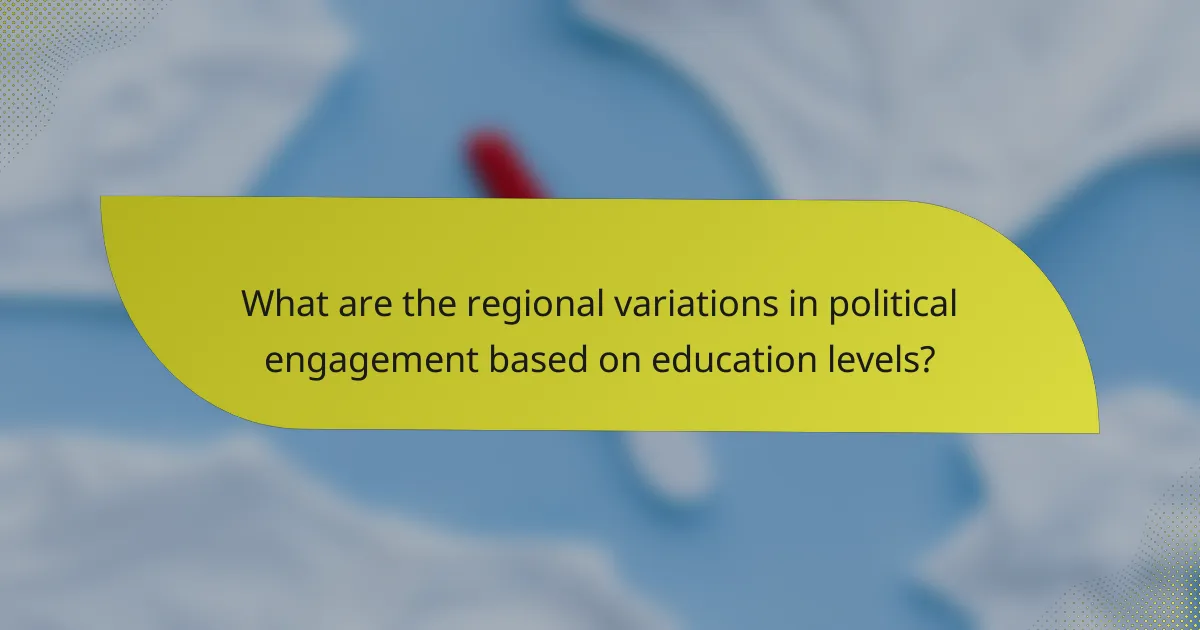
What are the regional variations in political engagement based on education levels?
Political engagement varies significantly across regions, influenced by education levels. Generally, higher education correlates with increased civic participation, but regional factors can create notable discrepancies.
Southern states show lower engagement despite education
In many Southern states, political engagement remains relatively low, even among educated individuals. Factors such as historical voting restrictions, socioeconomic challenges, and cultural attitudes contribute to this phenomenon.
For example, states like Mississippi and Alabama often report lower voter turnout rates compared to their Northern counterparts, despite similar educational attainment levels. This suggests that education alone does not guarantee higher political participation in these regions.
Urban areas exhibit higher political participation rates
Urban areas tend to have higher political engagement, with education playing a crucial role. Cities often provide more resources, such as community organizations and civic education programs, which encourage participation.
For instance, metropolitan regions like New York and San Francisco show significantly higher voter turnout and civic involvement compared to rural areas. This trend highlights the importance of access to information and community support in fostering political engagement.
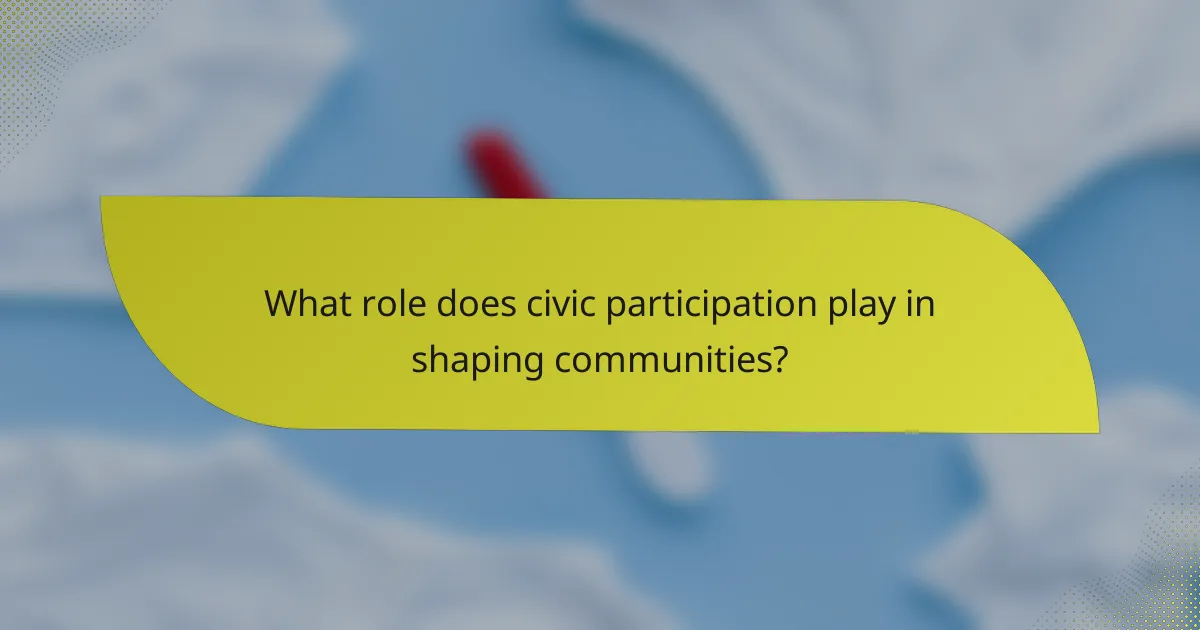
What role does civic participation play in shaping communities?
Civic participation is crucial for shaping communities as it empowers individuals to engage in decision-making processes and influence local policies. Through active involvement, residents can address community needs, advocate for change, and foster a sense of belonging.
Civic engagement fosters community development
Civic engagement plays a vital role in community development by encouraging collaboration among residents, local organizations, and government entities. When individuals participate in community initiatives, they contribute to the identification of local issues and the creation of solutions that reflect the community’s values and needs.
Examples of civic engagement include volunteering for local nonprofits, attending town hall meetings, or participating in community planning sessions. These activities not only enhance social cohesion but also lead to tangible improvements in public spaces and services.
Participation enhances local governance effectiveness
Active participation in civic life enhances the effectiveness of local governance by ensuring that elected officials are held accountable and responsive to their constituents. When community members engage in governance processes, they provide valuable feedback and insights that can lead to better policy decisions.
For instance, regular public forums can facilitate dialogue between citizens and local leaders, allowing for the discussion of pressing issues such as public safety, education, and infrastructure. This two-way communication helps to align government actions with community priorities, ultimately leading to more effective governance.
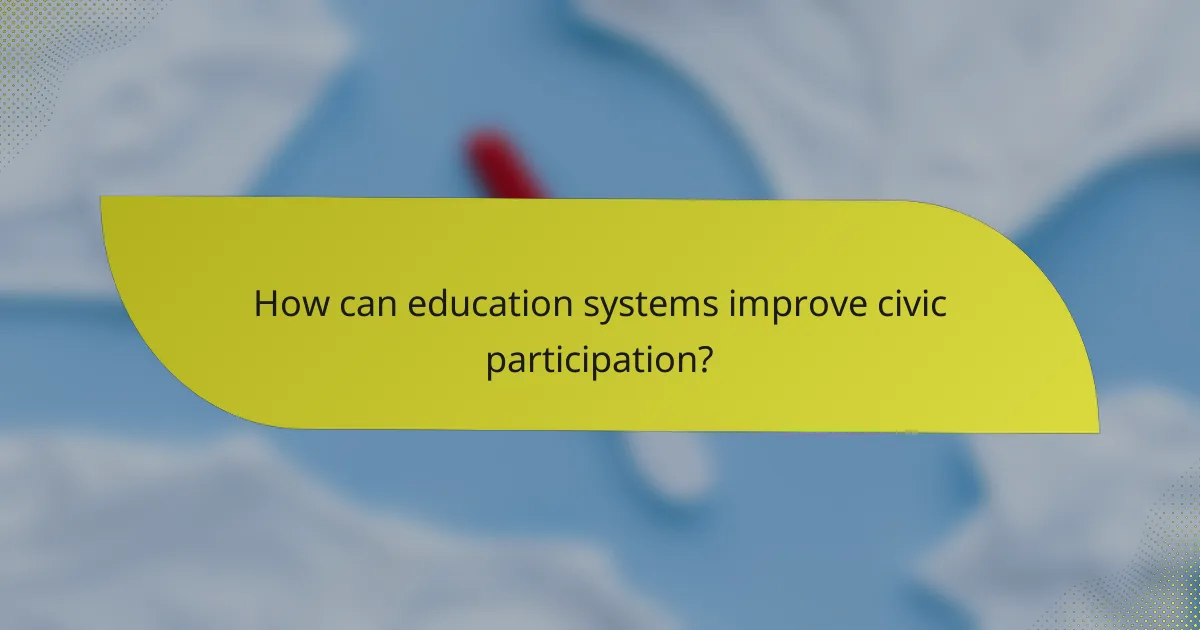
How can education systems improve civic participation?
Education systems can enhance civic participation by embedding civic education into curricula and encouraging community engagement. This approach equips students with the knowledge and skills necessary to actively participate in democratic processes and local initiatives.
Integrating civic education in school curricula
Integrating civic education into school curricula involves teaching students about their rights, responsibilities, and the functioning of government. This can include lessons on the electoral process, the importance of voting, and the role of civic engagement in a democracy.
Practical implementation might involve interactive activities such as mock elections, debates, and discussions on current events. Schools can collaborate with local organizations to provide real-world context, helping students understand the impact of civic participation in their communities.
Promoting community service initiatives
Promoting community service initiatives encourages students to engage with their communities and understand local issues. Schools can facilitate partnerships with non-profits and local governments to create service-learning opportunities that align with academic goals.
Examples of community service initiatives include organizing clean-up days, volunteering at local shelters, or participating in civic advocacy campaigns. These experiences not only foster a sense of responsibility but also help students develop valuable skills such as teamwork and leadership.
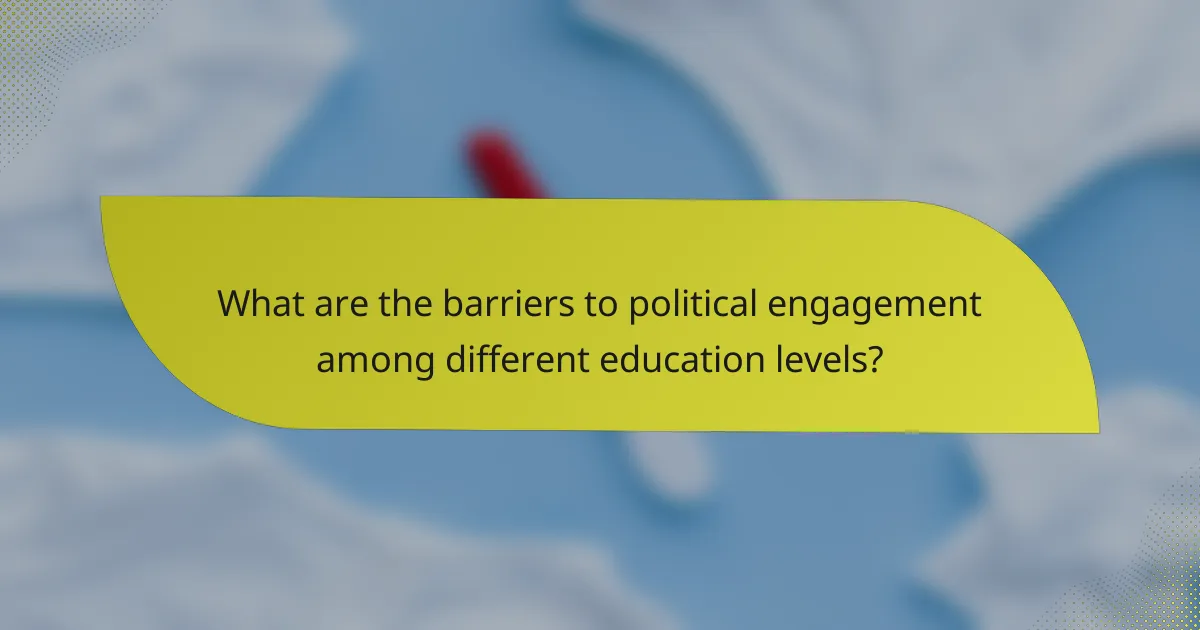
What are the barriers to political engagement among different education levels?
Barriers to political engagement vary significantly across different education levels, often influenced by socioeconomic status, access to information, and civic knowledge. Individuals with lower education levels may face greater challenges in participating in political processes due to these factors.
Socioeconomic factors limit participation
Socioeconomic status plays a crucial role in political engagement, as individuals from lower-income backgrounds often lack the resources to participate fully. Financial constraints can limit access to transportation, childcare, and time off work, making it difficult for them to attend political events or vote.
Additionally, those with lower socioeconomic status may feel disenfranchised or believe that their voices do not matter in the political landscape. This perception can lead to lower turnout rates and reduced involvement in civic activities.
Access to information varies by education
Access to information is often tied to education levels, affecting individuals’ ability to engage politically. Higher-educated individuals typically have better access to reliable news sources and educational resources, enabling them to stay informed about political issues and candidates.
Conversely, those with lower education levels may rely on less credible sources or lack the skills to critically evaluate information. This gap can hinder their understanding of political processes and discourage active participation in civic life.
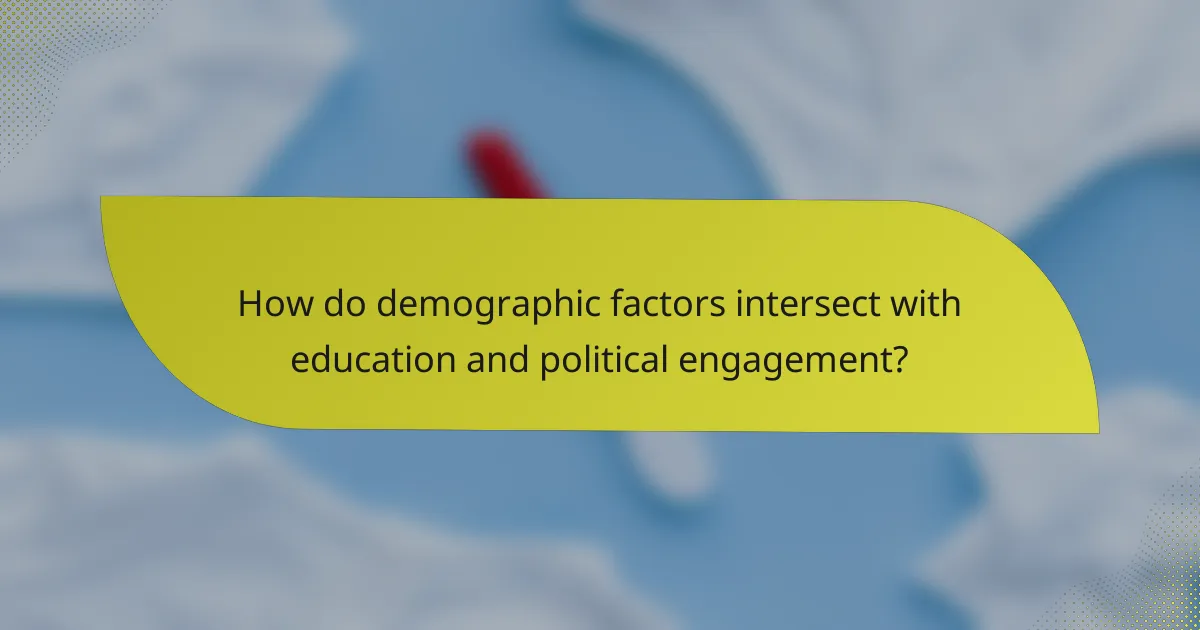
How do demographic factors intersect with education and political engagement?
Demographic factors such as race, ethnicity, and age significantly influence education levels and political engagement. Understanding these intersections can help identify trends in civic participation and voting behavior across different communities.
Race and ethnicity influence civic participation
Race and ethnicity play a crucial role in shaping civic participation. For instance, minority groups may face systemic barriers that affect their ability to engage in political processes, such as voting or community organizing. These barriers can include language differences, socioeconomic challenges, and historical disenfranchisement.
In the United States, studies show that Black and Hispanic voters often participate at lower rates compared to their White counterparts, although this gap has been narrowing in recent elections. Community outreach and education initiatives can enhance participation among these groups, emphasizing the importance of representation and access to resources.
Age demographics affect voting behavior
Age significantly impacts voting behavior, with younger voters often showing lower turnout rates compared to older populations. For example, individuals aged 18-24 typically engage less frequently in elections than those aged 45 and older. This trend can be attributed to various factors, including life stage, interest in politics, and accessibility to voting information.
To improve engagement among younger voters, strategies such as social media campaigns and educational programs in schools can be effective. Encouraging early voting and simplifying registration processes may also help increase participation rates in this demographic, ultimately fostering a more inclusive political landscape.
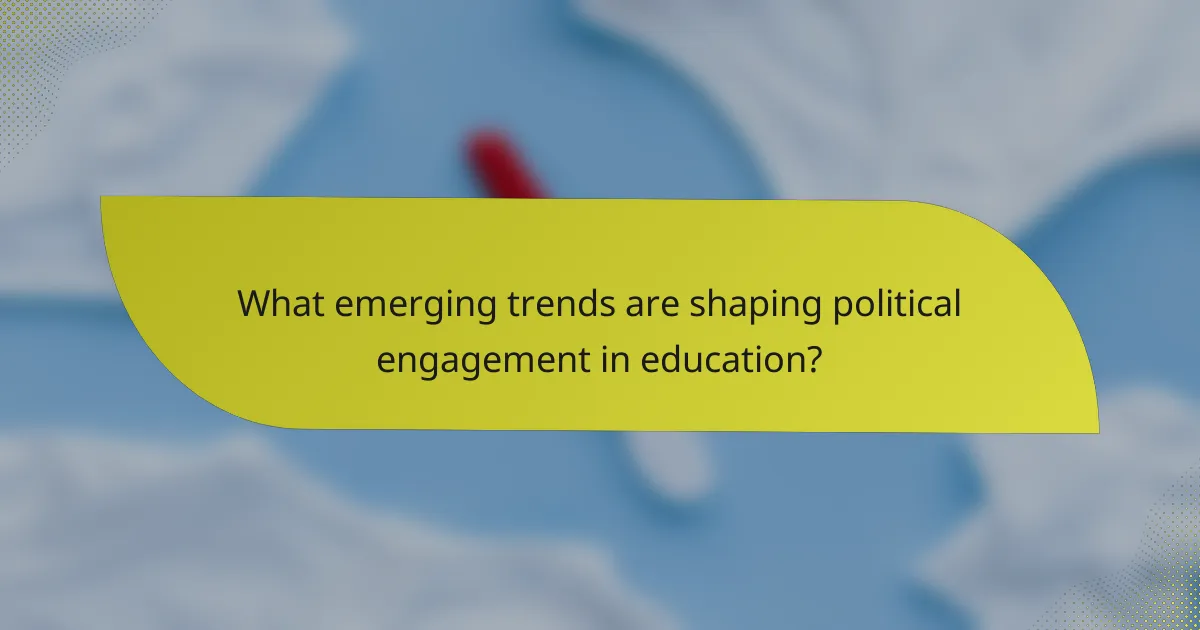
What emerging trends are shaping political engagement in education?
Emerging trends in political engagement within education are increasingly influenced by technology and a growing emphasis on youth activism. These factors are reshaping how students and educators participate in civic life, making it more accessible and impactful.
Online platforms enhance civic participation
Online platforms play a crucial role in enhancing civic participation by providing accessible tools for communication and organization. Social media, educational websites, and forums allow students to engage with political issues, share information, and mobilize for causes they care about.
For example, platforms like Twitter and Instagram are frequently used by students to raise awareness about social issues and organize events. This digital engagement can lead to increased participation in local elections and community initiatives, as students feel empowered to voice their opinions and influence change.
Increased focus on youth activism
There is a noticeable increase in youth activism, with young people taking a stand on various political and social issues. This trend is evident in movements addressing climate change, racial equality, and education reform, where students are not just participants but leaders.
Schools and universities are responding by incorporating civic education into curricula, encouraging students to engage in activism. Programs that promote critical thinking and debate skills help students articulate their views and mobilize peers, fostering a generation that is more politically aware and active.
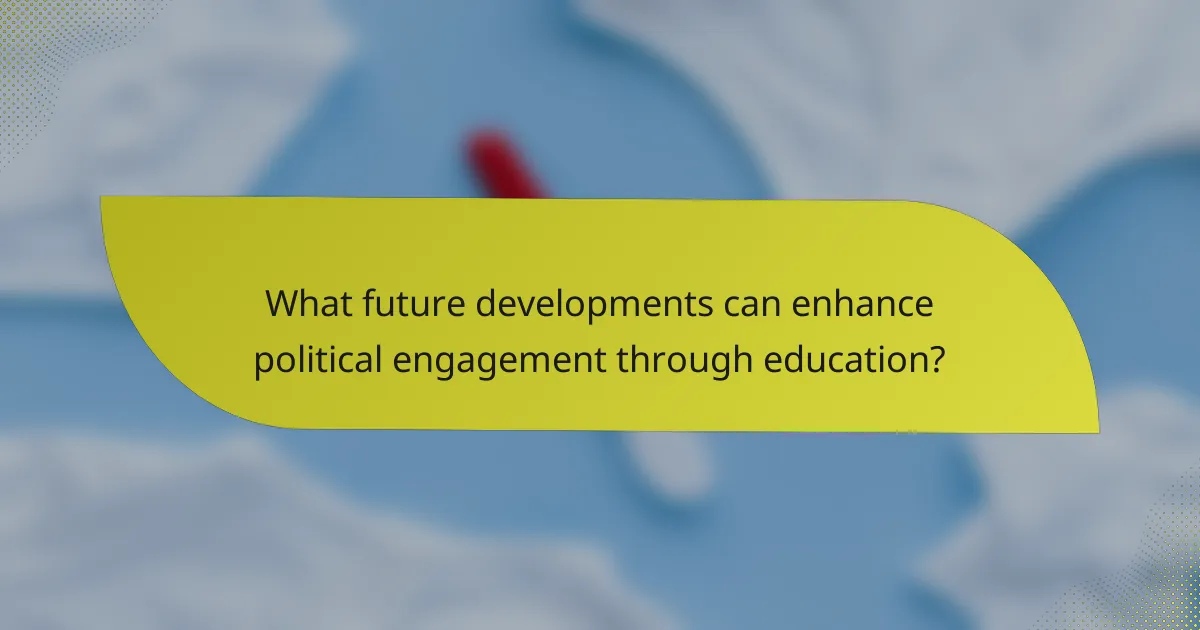
What future developments can enhance political engagement through education?
Future developments that enhance political engagement through education include integrating innovative teaching methods and fostering collaborations between schools and local governments. These strategies can create more interactive and relevant civic education experiences, encouraging students to participate actively in their communities.
Innovative teaching methods for civic education
Innovative teaching methods, such as project-based learning and simulations, can significantly boost civic education. By engaging students in real-world scenarios, these approaches help them understand the complexities of political systems and the importance of their participation.
For instance, role-playing exercises that simulate legislative processes allow students to experience decision-making firsthand. Incorporating technology, like online platforms for debates or discussions, can also enhance engagement by making learning more accessible and interactive.
Collaborations between schools and local governments
Collaborations between schools and local governments can strengthen civic education by providing students with practical insights into local governance. These partnerships can include internships, community service projects, or guest lectures from local officials, which help students connect classroom learning with real-life civic responsibilities.
Such initiatives can also facilitate student involvement in local decision-making processes, fostering a sense of ownership and responsibility. Schools might consider establishing regular forums where students can voice their opinions on community issues, thereby enhancing their political engagement and awareness.
